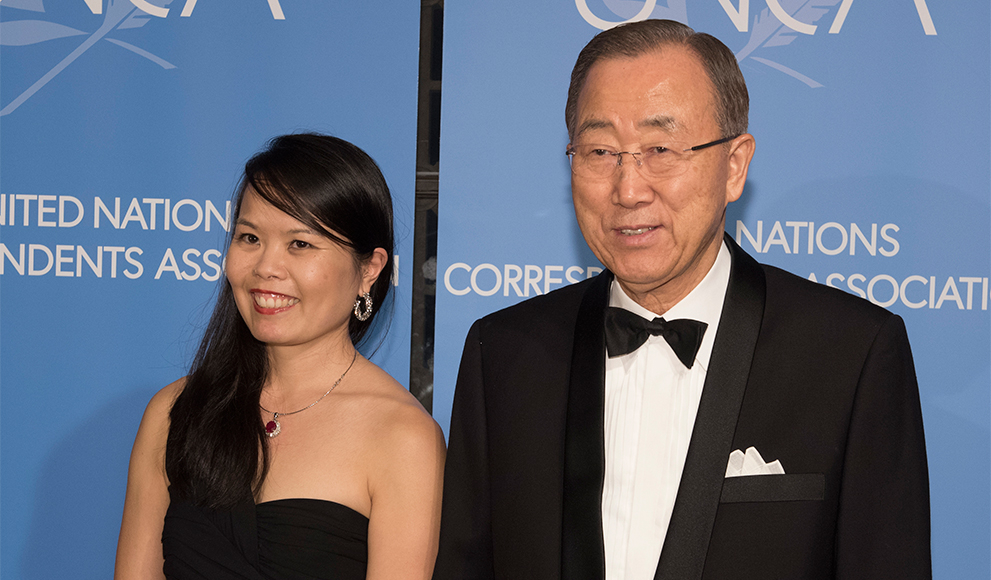Amy Yee '96 Awarded United Nations Correspondents Association Global Prize Silver Medal For Coverage Of Climate Change

Amy Yee ‘96 said she wanted to be a writer since she was a child and knew journalism was one possible path. Now an award-winning journalist, Yee recently received the 2015 Prince Albert II of Monaco and United Nations Correspondents Association (UNCA) Global Prize for coverage of Climate Change silver medal. Her award-winning report, The Floating Gardens of Bangladesh: Farming on Water to Prevent the Effects of Climate Change, was published in the New York Times.
"I love the social impact of journalism, especially when reporting about poverty and social justice from the developing world," said Yee in an email.
The 2015 medal was Yee's third UNCA award. In 2014, she won the Gold prize for a long piece about climate change in the Sundarban mangrove forest of Bangladesh. The story was also a Notable Essay in the Best American Essays 2015 anthology. In 2013, she won a UNCA bronze prize for articles about how Bangladesh has managed to dramatically improve the health of young children, contrasted with India, which is lagging behind in reducing child mortality. That reporting was part of a series that also won First Place in the Association of Healthcare Journalists contest in 2014.
While at Wellesley, Yee pursued an English and History double major, graduating magna cum laude, then earned an MFA in Creative Writing from Hunter College in New York with a "generous postgraduate scholarship from Wellesley." Her honors thesis was a short story collection, one of which won a national fiction prize. In 2014, she earned an MS from Columbia University as a Knight-Bagehot Fellow in Economics and Business Journalism.
Yee said some of her Wellesley experiences, including the opportunity to study abroad, influenced her work. "My junior year abroad at University of Edinburgh really opened up my world," Yee said. "I lived in a wonderful international house with people from all around the world and it was eye-opening to live outside the US for the first time and far from my native Boston."
After graduation, Yee won a Wellesley-Yenching Fellowship to teach English at Ginling College in Nanjing, China for two years. "I had no idea I would live in Mainland China, so the year of Mandarin I took at Wellesley was immensely useful then and continues to be such an important skill now," Yee said. "Many Tibetan refugees I've met speak Mandarin so that is how we communicate, and having that language skill has been extremely helpful."
Yee said living in China "brought to life" what she had learned in Paul Cohen's history class. Cohen, Professor Emeritus of History, retired from Wellesley in 2000 after teaching Chinese, and occasionally Japanese, history for 35 years.
"My two years in China was an invaluable experience that got me hooked on developing countries in transition. I loved [having] the chance to witness a country changing before your eyes and trying to understand the potential and the problems of a place going through such dramatic transformation," Yee said. She added that her experience in China prepared her well for her time in India. "China twenty years ago was very different from the China of today.... India was easy compared to China back then," she said.
Yee was a reporter with the Financial Times based in New York for seven years before going to work in India as their Delhi Correspondent. She began reporting widely across India, as well as Nepal and Bangladesh. "I loved India and stayed when I left the Financial Times to freelance and work on my book about Tibetan refugees," she said. She also spent two years working at a microfinance company in India.
When she returned to journalism, she focused on business approaches to reducing poverty, solutions to poverty, social enterprises, public health, clean energy, environment, climate change and other aspects of international development, as well as arts, culture and Tibet issues as a freelance writer. She has written for the New York Times, The Economist, NPR, the Wall Street Journal, Washington Post, Boston Globe, among many other publications. She is also a published poet and has been working on a narrative non-fiction book about Tibetan refugees in India and beyond for several years.
While at Wellesley, Yee won awards from the English Department, including the Wainwright Sonnet Prize, the Barnette Miller Prize in History and the Templeton Prize in Religion. She said these awards were "a wonderful boost" which gave her some affirmation to keep writing. "I'm grateful to Wellesley for all the support and opportunities that extended far beyond campus and has helped me, in some form, travel and report and write from around the world," Yee said.
Yee is currently on a reporting trip to Kenya. Before that, she was in Rwanda. “In recent years I've split my time between India and the US. I am deciding where to be based in the near-term—I could be the US or back in Asia,” she wrote, adding, “Let's see what awaits!”
Follow Yee's travels and writing, and see more of her photographs, on her website or on Twitter.
